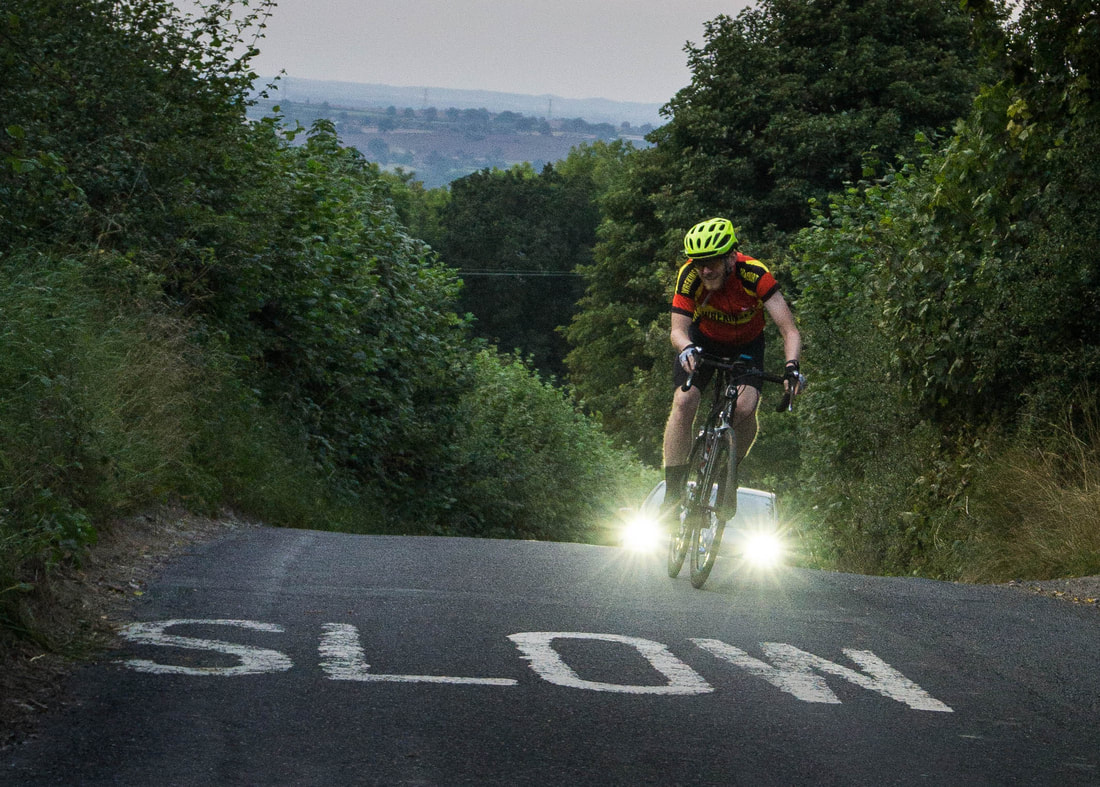|
Transitions - not the triathlon type ones characterized by hoping around on one foot trying to put running shoes on, but transition in the sense that the autumnal equinox sees us lose available light signifying the drawing to a close of evening rides leaving only a smattering of weekend events. It can leave us in a bit of a training quandary. There's no calendar to give us structure but it’s too early to start winter training. My default – and anecdotally this seems to be shared by some others – is to look back over the achievements of the season whilst peeling the wrapper off a box of delux chocolate biscuits. The next thing you know, it’s Christmas and my feet have disappeared. So, if you find yourself quandrified and in danger of slipping into a chocolatey abyss, here’s a few ideas. Have a break – Training and racing is physiologically and psychologically taxing so it’s definitely worth considering taking a break from the bike. If you force yourself to ride when you really don’t want to you it risks damaging enjoyment and motivation. It’s in the nature of endurance athletes to feel guilty when not training, not moving forward, but rest is a critical part of the process. The need to recover mentally as well as physically, is vastly underplayed – there’s a long winter ahead and to make the most out of it training needs to be approached with intent and purpose. Regenerating a bit of desire to train is no bad thing. If (like me) you think 'drifting' is a danger, or the concept of a break seems unconscionable, set a date for the break to end. That way, you're more likely to enjoy the break safe in the knowledge you have committed to recommence training at a fixed point. Looking forward to a re-start of training with enthusiasm is a powerful mindset. Cyclocross and track - Of course, racing does continue over winter should you wish to pursue it and there are weekly opportunities to indulge. The cyclocross season start earlier these days – often September – and viral apocalypses aside, indoor racing at velodromes abounds (3 nights a week at Manchester for example). Just check in with yourself that it is something that you actually want to do (rather than feel obliged to do) and that it fits in with your seasonal objectives. A change can be as good as a rest, but the change, I'd suggest, needs to be well considered. Strength & conditioning - It's hard to find evidence that going to the gym makes you faster on the bike - track sprinters, BMXers & increasingly team pursuit riders aside – but strong muscles work better, burn more calories and are less prone to injury. Also, importantly for older athletes and women, weight bearing exercise is good for bone density, as a low impact sport this is one of the few things that cycling doesn't help with. Training with weights is great for mental health too. It has been established that moderate aerobic exercise is at least as effective as anti-depressant medication for mood enhancement, this is only trumped by evidence that weight bearing resistance exercise is even more effective in improving outcomes for those suffering low mood and depression. If you’re fancying giving this a go, drop me a line because there are some cycling specific exercises that may help. Bicep curls isn't one of them. Learn a new skill - It's entirely possible you've heard enough about 'new skills' over lockdown so, on the assumption your sour dough bread is already on point, I’ve got some good resources (that’s code for ‘videos’) on getting started on rollers – great for variety and introducing abject terror into training sessions. Also, maybe worth looking at a taster session at a velodrome? If you’ve never ridden a fixed wheel bike on a velodrome before it’s a valuable skill to acquire – as well as being great fun, it will improve bike handling skills no end. Well worth the investment. And there's always pottery of course... Sort your plan and goals for 2022 – if you’re suffering with the curse of the endurance athlete - the combined feeling of dread, guilt, impatience and fear that you’re not doing enough exercise - settling on a structure and date for the recommencement of training can be just what the head doctor ordered. It can give the mind a little space to relax. If you’re struggling with setting SMART goals, here’s to a link to some helpful hints and information about how vital they are. Alternatively, here’s to a link to a blog telling you what a waste of time they are. Take your pick. If you’re starting to plan what winter 21/22 might look like for you, get in touch. It's a vital period and will go along way to determining your performance parameters for the 2022 season. Whilst September and October are often transitional – a time when structure is not at a premium – I reckon you’ll need to be starting winter training proper at the beginning of November. Rich Smith, an inveterate eater of chocolate biscuits, coaches UK and internationally based riders and has coached the Great Britain Transplant Cycling team for over 12 years. He is a British Cycling qualified Level 3 coach and a final year psychology student. He spent 30 years responding badly to people in authority in senior roles for Barclays, HSBC, British Waterways and National Grid Property before launching RideFast Coaching in 2015.
0 Comments
|
AuthorThe ramblings of a cycling coach... Archives
May 2024
Categories |
|
© COPYRIGHT 2022. ALL RIGHTS RESERVED.
|

 RSS Feed
RSS Feed
